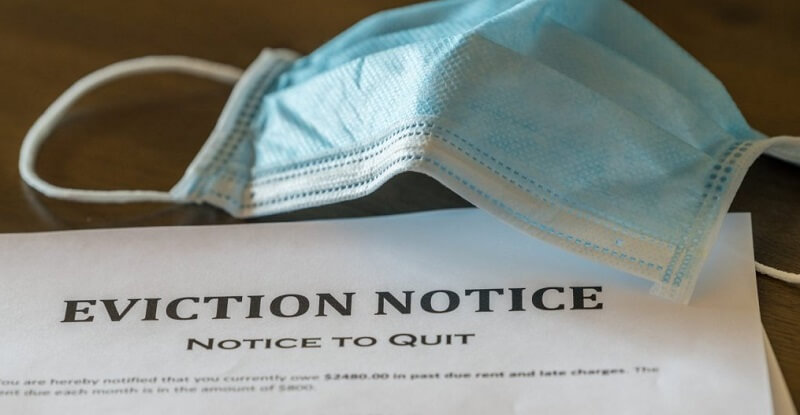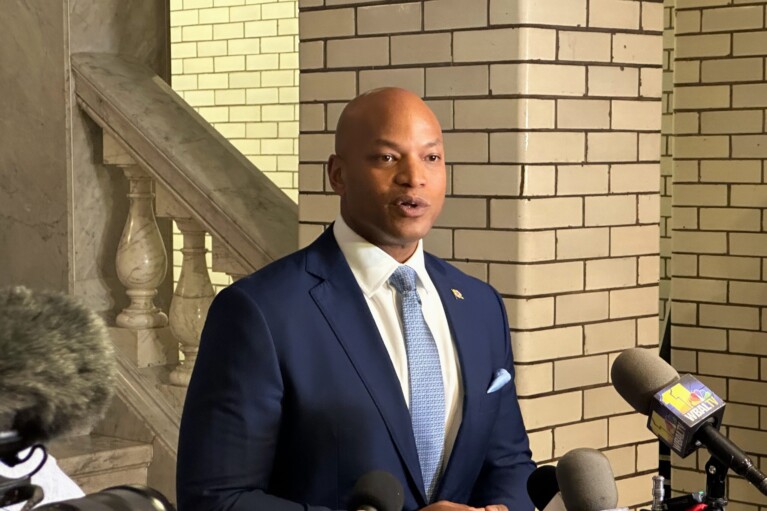Lawmakers Vow Renewed Push For Tenant Protections In 2022 Session

Maryland lawmakers passed an initiative in 2021 to give tenants access to counsel in eviction cases — but a separate measure that would’ve raised court filing fees and summary ejectment surcharges to pay for that legal access failed to pass before last year’s legislative session ended.
Now, legislators say they’ll again push for housing reform during the 2022 legislative session.
Del. Luke H. Clippinger (D-Baltimore City), who sponsored the bill that would’ve raised court fees to pay for the access to counsel bill, said he’ll introduce a similar measure this year.
“It’s still under construction,” Clippinger, the chair of the House Judiciary Committee, said. “But I do believe it’s an issue that the committee will pick up again in the ‘22 session.”
In addition to funding legal assistance, Clippinger’s bill was also intended to dissuade excessive eviction filings.
Leah Tulin, special assistant to Attorney General Brian E. Frosh (D), told lawmakers at a meeting last year that low court filing fees had created a “serial eviction filing problem” in Maryland even before the pandemic.
Frosh, a proponent of raising fees associated with evictions, is set to announce his legislative priorities on Monday. A spokesperson for Frosh declined to comment on whether raising filing fees would be one of those priorities.
The Attorney General’s Access to Counsel in Evictions Task Force, created as part of last year’s bill, released its an annual report on Wednesday. The task force recommends funding the access to counsel initiative via an appropriation in the state budget.
Task force members also concluded that Maryland’s high eviction rate of more than 600,000 filings per year before the pandemic was “problematic” — but eviction filings are expected to decrease because landlords now have to provide tenants with a 10-day notice of an eviction as a result of the 2021 bill.
Getting housing reforms across the finish line should be a priority in the General Assembly this year, said Del. Wanika B. Fisher (D-Prince George’s), who sponsored last year’s successful access to counsel initiative. The bill specifies that tenants earning less than 50% of the state median income will have access to an attorney through the Maryland Legal Services Corporation.
Clippinger’s bill wasn’t the only housing-focused bill that failed to pass before the end of the 2021 legislative session: The Maryland Senate failed to act on a bill from Del. Jheanelle K. Wilkins (D-Montgomery) that would have expanded emergency protections for tenants during the COVID-19 pandemic and future catastrophic health emergencies and would have also extended protections after those emergencies expire.
Wilkins said she’s introducing a bill this session to allow local governments to set up “just cause” eviction laws aimed at tenant holding over cases. Tenant holding over filings occur when a tenant remains on a property after a lease ends. Such cases increased during the pandemic, when tenants had protections from other types of filings related to nonpayment of rent.
“Although our intent as a state has been to keep people in their homes, because there’s no standard for non-renewal of lease, you don’t have to give any sort of reason, it’s pretty much the easiest way to evict someone. What we are finding is that that is widely being used as a way to get tenants out,” Wilkins said.
Wilkins’ bill would require landlords filing claims to specify just causes. Examples include a tenant is disturbing other residents or breaking provisions of a lease, but the details will largely be up to local governments if they opt to enact their own legislation. In prior sessions, Wilkins sponsored legislation that would’ve allowed Montgomery County officials to set up their own just cause eviction bill, but those efforts were unsuccessful.
Wilkins said her bill wouldn’t affect other types of evictions like failure to pay rent and breach of lease.
“When a tenant’s lease is up and they have just 60 days notice, especially in some of these very expensive jurisdictions to find new housing, we want to ensure that that type of displacement is not arbitrary, and that there’s cause that is provided,” Wilkins said.
Wilkins noted that some of the housing legislation that is set to be reintroduced in 2022 passed the House of Delegates in 2021 but languished in the state Senate. She said she’s been reaching out to senators to talk about prioritizing housing reforms amid the recent COVID-19 surge and the disbursement of federal rental assistance, which has been sluggish at times.
“We have to ensure that we’re on the same page with our Senate partners around some of the provisions that we got hung up on last time, and I think we have to make the case for the true impact of the crisis,” Wilkins said.
Del. Vaughn M. Stewart (D-Montgomery) is planning on introducing legislation that would delay an eviction when a tenant can prove they’ve applied for rental assistance.
“Right now we have a perverse situation in the state where tenants cannot afford to pay rent due to the pandemic or indirectly related to the pandemic,” Stewart said, “and they’re eligible for rental assistance, and they apply for rental assistance, but they’re evicted before they get their money.”
Sen. Shelly L. Hettleman (D-Baltimore County), who will be the sponsor of the Senate version of the rental assistance protection bill, also said she plans to emphasize housing’s role in protecting Marylanders from COVID-19 during the upcoming legislative session.
“First and foremost this is a public health issue, and if you’re putting people out of their homes, it has a dramatic effect on public health,” Hettleman, the Senate sponsor of the 2021 access to counsel bill, said.
Tenants in Maryland have a “right to redeem,” meaning they can pay past due amounts and fees to stop an eviction. But Stewart said a “very small minority” of landlords are arguing that checks from government agencies aren’t explicitly listed as an acceptable form of payment and evictions can move forward despite the past-due rent being paid.
Stewart said he doubts that claim would hold up in court, but said he’s also planning legislation to add rental assistance checks from government agencies to the list of acceptable payments.
According to the National Equity Atlas, which estimates rent debt based on U.S. Census and Treasury data, there are an estimated 111,000 households behind on rent in Maryland for an estimated $367.9 million in rent debt. Roughly 79% of tenants behind on rent in Maryland are people of color, according to the National Equity Atlas, 49% are unemployed and 78% have an income of less than $50,000 per year.
“Marylanders are still hurting, and housing is people’s survival,” Fisher said.




 Creative Commons Attribution
Creative Commons Attribution